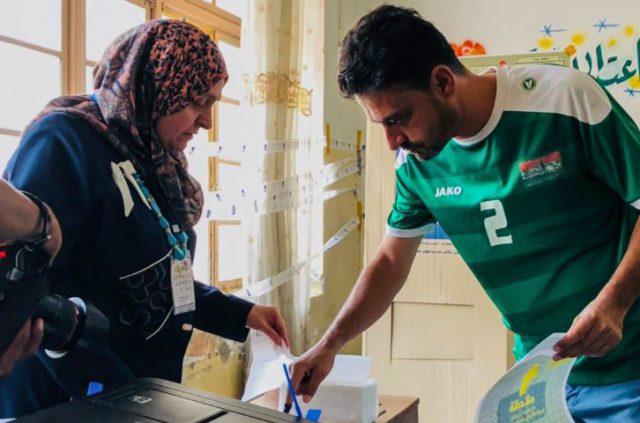
The beat
Protests in Georgia against police brutality
Video on social media shows thousands of people in Georgia protesting against police brutality in front of the Georgian parliament. The protests followed the arrests of eight people at two popular clubs in Tbilisi on suspicion of drug dealing in what demonstrators have described as a heavy-handed action. Protests continued through the weekend until Georgian Interior Minister Giorgi Gakharia acknowledged the demonstrators, saying ‘I apologise to you in the name of those employees of the Ministry if any of them violated your rights’, and pledged to investigate police brutality.
Bavarian police gain expanded powers
Bavaria’s governing party has pushed through a law that could significantly expand police powers. The centre‑right Christian Social Union, part of Chancellor Angela Merkel’s conservative bloc, used its majority in the state assembly to pass the new laws to strengthen its law and order image ahead of elections in the fall. The new laws grant police expanded authority to undertake preventative measures such as targeted surveillance if there’s a reasonable threat of a crime occurring.
A new policing strategy for New York
The largest law enforcement agency in America, the NYPD, has adopted a new policing strategy that it calls ‘precision policing’, which focuses on investigating the ‘small percentage of offenders who do most of the crime in the city’. The NYPD’s move aims to replace confrontation with increased community engagement to repair a fractured relationship with New York City’s residents. NYPD’s community relations have been strained for years because of its controversial ‘stop and frisk’ strategy, which allowed officers to search anyone they believed might commit a crime.
CT scan
Training for the next Marawi
The US and the Philippines kicked off their annual Exercise Balikatan. The exercise traditionally focuses on interoperability and disaster relief, but after last year’s battle to recapture Marawi from Abu Sayyaf, it will now concentrate on counterterrorism. Exercise Balikatan will include live-fire operations and military drills in urban terrain to reflect city battlefields like Marawi. Such training remains pertinent: on 15 May Islamic State released a statement extolling how ‘soldiers of the Caliphate’ killed 33 Philippine ‘crusaders’ in three days of fighting in Sulu province, one of two remaining Abu Sayyaf strongholds in the Philippines.
Do terrorists change their stripes?
In Iraq’s parliamentary elections, the political alliance of Moqtada al-Sadr, former leader of the Shia Mahdi Army, proved to be the biggest surprise, outpolling Prime Minister Haider al-Abadi’s Victory bloc, which was running third after early counting. Though no political group is likely to win a clear majority, al-Sadr is set to be the key powerbroker in the formation of any new coalition government. The election came just days after Lebanon’s ‘Shia duo’ of Hezbollah and Amal won 29 of 128 seats in Lebanon’s first election in nearly a decade. Though the lure of electoral victory doesn’t guarantee that terrorists will disarm—Hezbollah remains active in Syria for example—there’s a precedent for the terrorist-turned-politician. Since 2008, al-Sadr has forsworn violence against the Iraqi government in order to contest parliamentary elections.
Checkpoint
Improved EU money-laundering legislation
The EU adopted a new directive to prevent money laundering and terrorist financing. The changes address the use of alternative finance systems such as virtual currencies that currently fall outside the scope of EU law, and improve cooperation between financial intelligence units. The UK National Crime Agency cautioned that the UK’s exit from the EU will ‘likely make the country more vulnerable’ to money laundering because the pursuit of new trade partners outside the EU will result in more complex and difficult-to-monitor trade arrangements, and will increase the likelihood of coming into contact with corrupt markets.
Russian bridge to Crimea
Vladimir Putin has opened Russia’s first road link to Crimea. The four-lane, 12‑mile-long bridge is the longest in Europe. It’s expected to be used by 14 million people a year. Putin ‘christened’ the new bridge by driving across it into Crimea behind the wheel of a bright orange Kamaz truck, manufactured by one of Putin’s KGB colleagues who is currently subject to US sanctions.
Effects of migrant crisis continue in Bosnia
As stricter border controls have been implemented in Serbia, migrants have turned to Bosnia. Around 4,000 asylum seekers and irregular migrants have entered Bosnia since the beginning of the year, compared to 755 in 2017. Bosnia’s handling of the crisis has been criticised by the Council of Europe’s Commissioner for Human Rights, while Bosnian officials have retorted that the influx is placing immense pressure on Bosnia’s already-weak economy.
First responder
Digitally vulnerable
In a climate of increased concern about data privacy, the EU’s new General Data Protection Regulation is expected to come into force later this month. The regulation is likely to affect data collected by humanitarian organisations such as the UN’s Centre for Humanitarian Data. The centre was established last year to provide an open platform for sharing information to support humanitarian efforts. But open source data could pose risks to already-vulnerable people.
A new dimension for first responder training
First responders to terrorist attacks can literally take their training to another dimension in using the virtual reality program Automated Serious Game Scenario Generator for Mixed Reality Training (AUGGMED). By simulating real-world situations, the program will provide much more up-to-date training to keep up with the evolving nature of terrorist attacks. AUGGMED has been used in Europe and by the British police to improve their response training.
How do you respond to a sticky situation?
Earlier this week a truck carrying melted chocolate created a sticky situation for first responders in Poland. The truck overturned and spilled 12 tons of liquid chocolate onto the road. Heavy machinery and a fire brigade were needed to clean up.